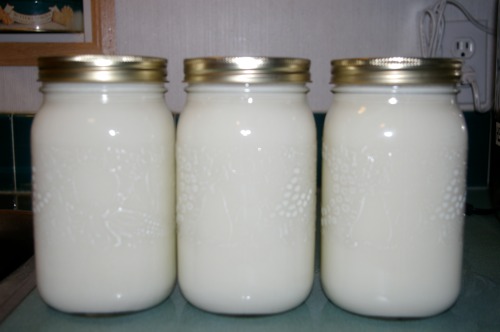Ontario made pasteurization of milk mandatory in 1938, but Health Canada did not make it mandatory until 1991. Canada bans the sale of raw milk but not its consumption. Although it is illegal to sell raw milk in Canada, consumers can own a share in the ‘source’ cow, which is what dairy farmer Michael Schmidt’s customers do. On Thursday, January 21st, 2010, Justice of the Peace Paul Kowarsky acquitted Michael Schmidt on 19 charges relating to the distribution of his raw milk. Because Schmidt had made diligent efforts to keep his cow-share program operating “within the confines and the spirit of the legislation”, JP Kowarsky concluded that the alleged offence fell into the category of ‘strict liability’; that is, criminal intent (‘mens rea’) could not be proved.
Schmidt had been prepared to do battle on a human rights level, and challenge the statutes on the ground that they violated his basic human right to ‘life, liberty and security of person’. In November of 2009, the Canadian Constitution Foundation (CCF)—an independent, non-partisan, registered charity—announced its support for Schmidt on the grounds that consumers have the rights to choose what they put in their bodies, freedom of contract, and freedom from government regulation that is ‘arbitrary, unreasonable, unnecessary and unfair’. Even the existing cow-share system is an unnecessarily complex response to overly restrictive legislation. However, with Schmidt’s full acquittal, these complex legal issues may go unchallenged.
The Ontario government may choose to let the ruling stand, and live with the reality of cow-share arrangements. However, this is not satisfying the general public, because many people who would like to be able to access raw milk are unable to access a cow-share program; consequently, they have approached the CCF to see if they could pressure the government to change the law. According to Karen Selick (litigation director the CCF), if the government of Ontario wants to take the matter further, it has three options:
1. The government could appeal this decision. This would be a risky move because there is nothing to ensure it would be successful; moreover, it could backfire and escalate the confrontation of citizens and legislators. Schmidt and his long struggle have gained wide public support: the more people learn about his plight and educate themselves on the scientific and potential health benefits of consuming raw milk, the more people will want free access to it.
2. The government could create new legislation that specifically outlaws cow-sharing and/or the consumption of raw milk. However, there is strong opinion that, should the government choose this option, it would be met by public outrage, particularly from the burgeoning ‘food freedom’ movement. Furthermore, this would seem to constitute a breach of human rights at a most basic level, so the government would likely find themselves facing the CCF in court. In addition, policing the personal consumption of raw milk would be costly, if not impossible. Is someone going to be assigned to spy on farmers to ensure they are not sneaking a contraband tipple in the privacy of their own milking parlours?
3. The government could develop a regulatory procedure that would facilitate the sale of certified, safe, raw milk for interested consumers without requiring a cow-sharing arrangement. Schmidt and others—like Ontario raw milk advocate James McLaren—have offered to work with government officials to help develop the certification process. As Selick said in her article ‘Got Milk Justice’ (National Post, January 26, 2010), “Michigan is doing it right now. Why shouldn’t Ontario?”
Option 3 would be not only the most satisfactory solution for consumers, but also the most democratic.
Link to The Bovine: is a blog about rights around access to raw milk ,and chronicles the saga of Michael Schmidt, of Glencolton Farms, and his cow share holders with the authorities over the issue of access to raw milk.


